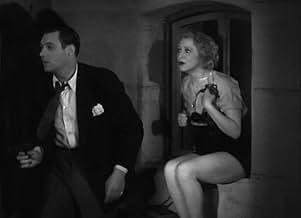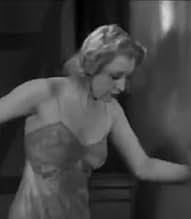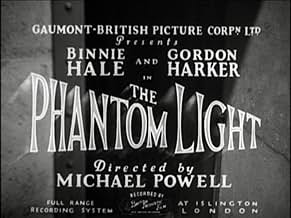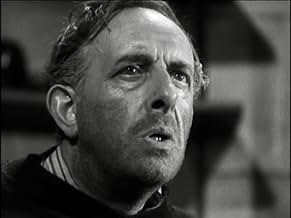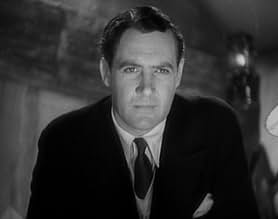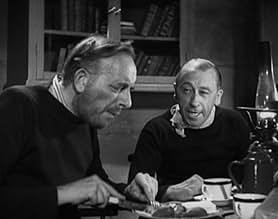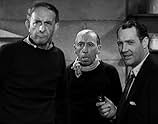A lighthouse keeper has been murdered in mysterious circumstances and, during the ensuing investigation a Phantom Light keeps appearing at the scene of his death.A lighthouse keeper has been murdered in mysterious circumstances and, during the ensuing investigation a Phantom Light keeps appearing at the scene of his death.A lighthouse keeper has been murdered in mysterious circumstances and, during the ensuing investigation a Phantom Light keeps appearing at the scene of his death.
Anthony Holles
- Mr. Mason
- (uncredited)
Ernest Jay
- Railway Worker
- (uncredited)
Vi Kaley
- Woman in Pub
- (uncredited)
John Singer
- Cabin Boy
- (uncredited)
Featured reviews
I didn't expect much from this obscure film and that was the right approach.
The film's pace is a big letdown - it's consistently slow from beginning to end. The scriptwriters couldn't have been bothered with the development of the story, as it is never made clear what is going on.
Gordon Harker does quite well and tries his best to enliven the proceedings but it's all in vain.
With its wafer thin plot, this relies on the likeability of its cast and it's got just enough of that to make this entertaining from beginning to end. Gainsborough reused the story six years later as BACK ROOM BOY with Arthur Askey and although this won't be in anyone's top ten, it least it doesn't have Arthur Askey in it!
As naff as this is, I think I enjoyed it. I might even watch it again sometime. Why - because it was fun without being a comedy, exciting without being a thriller and watchable without being particularly well made. It relies on its two leads: Binnie Hale and professional cockney Gordon Harker. He's your typical grumpy but loveable cor blimey gov'nr cockney and he really carries this single handedly. He's also got some lovely old forgotten East End expressions. Surely it's time to resurrect this one: "I'll lay a pound to a sausage." It must mean something?
Just as I'm convinced that Genevieve Tobin is Joan Blondell's sister, Binnie Hale obviously must also be another sibling. She was an established actress on the stage but she hadn't quite mastered movie acting, nevertheless she's still better than a lot of established stars over in California. Looking at her, it's hard to believe she's actually the sister of Jessie Matthew's other half - whom, if you're familiar with Sonnie Hale - let's just say he didn't have the classic movie star looks! She's actually rather lovely (which you'd expect if she's Joan Blondell's long lost English sister!)
Some actresses have a magnetic screen presence because of their talent, Miss Hale might not exhibit a lot of talent but she certainly exhibits a lot of her legs - very nice legs too! Since Joseph Breen and his cohorts over in America had by 1935 banned anything remotely saucy, it fell on the shoulders of the British film industry to provide the public with a little bit of sexiness and Binnie Hale in shorts and negligee - not just a negligee but a wet negligee, certainly ticks that box.
Gainsborough in the early thirties didn't really do quality, they just made the sort of stuff you could veg out to with your brain switched off after a hard day's work. They were owned by Gaumont-British so had the same sort of relationship First National did to Warner Brothers. They made cheap simple, basic entertainment for the masses. So if you're not expecting too much from this, I'll lay a pound to a sausage that you might just enjoy it.
As naff as this is, I think I enjoyed it. I might even watch it again sometime. Why - because it was fun without being a comedy, exciting without being a thriller and watchable without being particularly well made. It relies on its two leads: Binnie Hale and professional cockney Gordon Harker. He's your typical grumpy but loveable cor blimey gov'nr cockney and he really carries this single handedly. He's also got some lovely old forgotten East End expressions. Surely it's time to resurrect this one: "I'll lay a pound to a sausage." It must mean something?
Just as I'm convinced that Genevieve Tobin is Joan Blondell's sister, Binnie Hale obviously must also be another sibling. She was an established actress on the stage but she hadn't quite mastered movie acting, nevertheless she's still better than a lot of established stars over in California. Looking at her, it's hard to believe she's actually the sister of Jessie Matthew's other half - whom, if you're familiar with Sonnie Hale - let's just say he didn't have the classic movie star looks! She's actually rather lovely (which you'd expect if she's Joan Blondell's long lost English sister!)
Some actresses have a magnetic screen presence because of their talent, Miss Hale might not exhibit a lot of talent but she certainly exhibits a lot of her legs - very nice legs too! Since Joseph Breen and his cohorts over in America had by 1935 banned anything remotely saucy, it fell on the shoulders of the British film industry to provide the public with a little bit of sexiness and Binnie Hale in shorts and negligee - not just a negligee but a wet negligee, certainly ticks that box.
Gainsborough in the early thirties didn't really do quality, they just made the sort of stuff you could veg out to with your brain switched off after a hard day's work. They were owned by Gaumont-British so had the same sort of relationship First National did to Warner Brothers. They made cheap simple, basic entertainment for the masses. So if you're not expecting too much from this, I'll lay a pound to a sausage that you might just enjoy it.
Gordon Harker arrives at the tiny Welsh village where everyone seems to be named Owen. He's to take over the light house in the bay. He listens to stories about the Ghost Light that led the two earlier masters to their death: the light goes out, another one appears, and guides a ship onto the rocks. "Wreckers" he says, and thinks no more of it. He also doesn't think much of Ian Hunter, who claims to be a reporter and offers him lots of money to go to the lighthouse, nor of Binnie Hale, who also makes the same request. He's proud of his 25 years in the service, and runs things by the book. When he gets to the house, there's a helper who's being tended to by doctor Milton Rosmer. Most of the time he's out, but occasionally he gets up and tries to kill someone with his bare hands.
It's a nicely opened version of the stage play by Evadne Price and Joan Roy Byford., with some nice location shooting in th west counties and Wales. It makes me wonder if this was the inspiration for dirctor Michael Powell to wander the island, far from London, and look at the weird and wonderful way people live far from London.
It's a nicely opened version of the stage play by Evadne Price and Joan Roy Byford., with some nice location shooting in th west counties and Wales. It makes me wonder if this was the inspiration for dirctor Michael Powell to wander the island, far from London, and look at the weird and wonderful way people live far from London.
In '30's British films I've always liked the mix of pithy Music Hall humour, mild ghostliness, a frisson of sex, and manly London chaps saving the day, all displayed perfectly in the Phantom Light. Director Michael Powell's best stuff was yet to come of course, but this can be seen as him still learning his craft practising with more inconsequential trifles.
Gordon Harker here shines with some cracking comedy lines handed to him, as the new lighthouse-keeper at a rather ... insular Welsh coastal village, apparently 200 years behind the times with Wrecking ships on the rocks still big business. Ian Hunter is the manly Londoner with all the brains ... er, I think this was his last British film until after the War ended. He was the best King Richard Hollywood ever had! Until the last reel Binnie Hale has no brains but admirably compensates with long legs. Herbert Lomas perfects the character he particularly re-used later in Ask a Policeman and The Ghost Train - he was even back in Powell & Pressburger's I Know Where I'm Going! But the film that borrowed the most from this was Arthur Askey's Back Room Boy from '42, it even looked the same inside the lighthouse!
A pleasant 75 minutes spent in the company of familiar faces and story.
Gordon Harker here shines with some cracking comedy lines handed to him, as the new lighthouse-keeper at a rather ... insular Welsh coastal village, apparently 200 years behind the times with Wrecking ships on the rocks still big business. Ian Hunter is the manly Londoner with all the brains ... er, I think this was his last British film until after the War ended. He was the best King Richard Hollywood ever had! Until the last reel Binnie Hale has no brains but admirably compensates with long legs. Herbert Lomas perfects the character he particularly re-used later in Ask a Policeman and The Ghost Train - he was even back in Powell & Pressburger's I Know Where I'm Going! But the film that borrowed the most from this was Arthur Askey's Back Room Boy from '42, it even looked the same inside the lighthouse!
A pleasant 75 minutes spent in the company of familiar faces and story.
First off there is a very nice DVD of this mixed with some other British Thrillers. Looks and sounds good. That's great because the movie isn't too gripping and would dissolve with any distractions. The movie is an odd mix of "silent" movie acting and a long set up that takes up way too much time. The welsh village is fun and interesting--there are other later British films that have this same kind of small village opener with a stranger appearing and a mystery being resolved. It's a formula that works more often than not. But the movie fails to really evoke much spookiness of the lighthouse itself. It's never interested in generating any suspense for very long. Usually there is some very brief suspense moment, and it's just to set up more comedy. The comedy is fairly funny but no real sense of danger is generated. No sense of the story moving forward. There are also touches from (then trend setting) Russian montage editing that seem kind of comical in an unintended way. As you'd expect from director Powell there are a few nice camera moves and some good location photography. A music score would have helped this film there is none at all, perhaps a cost saving element? Or just a wrong choice? There are things to enjoy here but you have to get over the 30's cliché elements of "flapper girl" and "spunky-male-reporter" and these are pretty creaky indeed. A movie that, perhaps in a very director Michael Powell way, flirts around with various quirky and occasionally unexpected ideas but doesn't commit to any of them enough to become a whole anything. Other reviews of it being an OK time killer are valid.
Did you know
- TriviaWhen Alice Bright (Binnie Hale) remarks that she had just been performing in a play, Sam Higgins (Gordon Harker) retorts, "East Lynne?" This is a reference to the oft produced play and movie of Mrs. Henry Wood's novel of the same name. "East Lynne" was enjoyed for its mad plot and frequently incomprehensible dialogue.
- GoofsSam Higgins arrives at Tan y Bwlch to take a boat to the North Stack lighthouse offshore. Both places exist but are about 60 miles apart. Tan y Bwlch is on the shore of a reservoir, not the sea, and North Stack lighthouse, on the isle of Anglesey, is onshore, not off.
- Quotes
Alice Bright: Mr Higgins. I'm going to tell you the truth. I'm an actress, hiding from the police.
Sam Higgins: What, you act as bad as all that?
- ConnectionsFeatured in Made in England: The Films of Powell and Pressburger (2024)
Details
- Runtime1 hour 16 minutes
- Color
- Aspect ratio
- 1.37 : 1
Contribute to this page
Suggest an edit or add missing content


